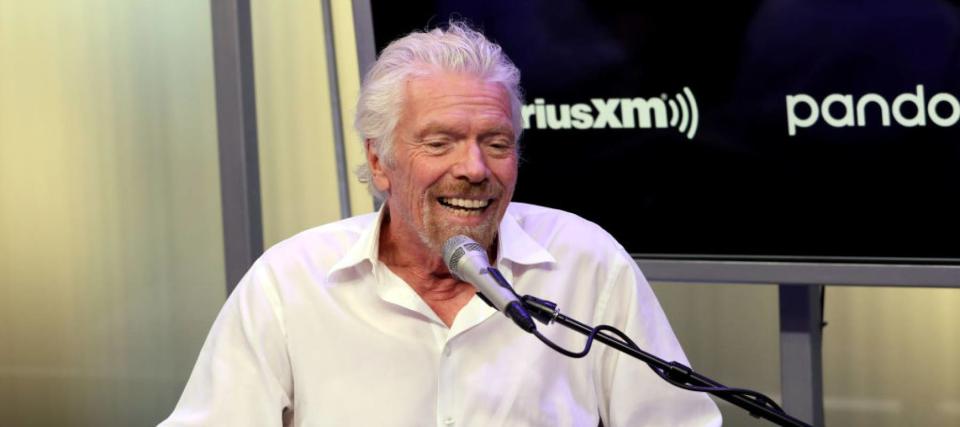Richard Branson says that money isn’t the key to success — and suggests figuring out this one thing instead

Richard Branson has built himself an empire. His Virgin Group enterprises stretch from the airline industry and telecommunications to space.
But Branson told CNBC Make It that he never did it for the money — nor would he advise anyone else to use wealth as a metric of success.
Don't miss
Commercial real estate has beaten the stock market for 25 years — but only the super rich could buy in. Here's how even ordinary investors can become the landlord of Walmart, Whole Foods or Kroger
Cost-of-living in America is still out of control — use these 3 'real assets' to protect your wealth today, no matter what the US Fed does or says
These 5 magic money moves will boost you up America's net worth ladder in 2024 — and you can complete each step within minutes. Here's how
“Paying the bills at the end of the year is important,” he said. “But what entrepreneurs are doing all over the world today — and the only reason they’re succeeding — is that they’re making a difference in other people’s lives. And that’s all that really matters.”
Yet, Branson is worth $2.1 billion, according to Forbes.
Here’s why Branson thinks having a purpose can earn you more in the long-term — and the research appears to back him up.
Can money buy happiness?
Branson began his entrepreneurial career in the magazine business. He created “Student,” a youth culture magazine which covered topics ranging from pop culture to the Vietnam War.
Branson argued that money wasn’t the “motivation” for his magazine; it was passion. He knew he needed to make enough to pay the printers, but he wasn’t thinking about getting rich off it.
However, money often flowed to Branson. He claims that it comes from following his curiosity — something he advises for anyone looking to create a successful business.
“We only have one life,” he said. “We spend a lot of time at work and it’d be sad if we’re only doing it for our paychecks.”
There is research that says a specific threshold of money can make you happy. The “hedonic treadmill” is a famous 1971 concept that economists Daniel Kahneman and Angus Deaton used in their 2010 paper. They came to the conclusion that a person’s day-to-day levels of happiness wouldn’t increase once you’d earned an average of $75,000 a year.
However, with inflation, that baseline figure may need to be revised. But even if it better reflected current day economics, Matthew A. Killingsworth and researchers from the University of Pennsylvania’s Wharton School argued that the hedonic treadmill may not be as universal as first thought.
Their 2021 reanalysis of Kahneman and Deaton’s conclusions discovered that more money actually can make you happier, even well above the original $75,000/year figure — that is, unless you were among the “least happy 20% of the population.”
“The exception is people who are financially well-off but unhappy,” Killingsworth, the lead paper author, said in an interview with Penn Today. “For instance, if you’re rich and miserable, more money won’t help.”
Read more: Jeff Bezos and Oprah Winfrey invest in this asset to keep their wealth safe — you may want to do the same in 2024
Making a difference
Branson told CNBC Make It that he asks himself two questions when he’s starting a new business venture:
If I create this, can it be better than what everybody else is doing?
Can it make a real difference in the world?
He said this is how he decided to begin both Virgin Atlantic in 1984 and Virgin Mobile in 1999.
“Maybe in America, ‘billionaire’ is a sign of success, but that rankles me,” the British entrepreneur said. “I think that your reputation is what you create.”
For Branson, his reputation is about his commitment to making the world a better place. This belief may be the reason that he is a billionaire. A 2016 study discovered that people with a sense of purpose tend to make more money than those without one.
The study said this sense of purpose allows people to make decisions for the long-term, rather than focusing on instant gratification.
Branson’s not the only billionaire saying this
There are many other billionaires who agree with Branson. Bill Gates and Warren Buffett have both been quoted as saying that their success came from following their interests.
“The thing you do obsessively between age 13 and 18, that's the thing you have the most chance of being world-class at,” Gates told Charlie Rose in a 2016 television interview.
When CNBC later asked Buffett about Gates’s advice, he said: “He was focused on software, I was focused on investments. And it gave me a big advantage to start very young — there’s no question about it.”
Oprah is another billionaire who agrees with Branson, particularly around finding purpose in her work.
“If you do something to make someone else happier, it's almost like it comes back to you exactly a hundredfold,” she told NPR in a 2023 interview. “That's where I get my great joy.”
What to read next
Car insurance premiums in America are through the roof — and only getting worse. But 5 minutes could have you paying as little as $29/month
Jeff Bezos, Mark Zuckerberg, and Jamie Dimon are selling out of US stocks in a big way — here's how to diversify into private real estate within minutes
'It's not taxed at all': Warren Buffett shares the 'best investment' you can make when battling rising costs — take advantage today
This article provides information only and should not be construed as advice. It is provided without warranty of any kind.
